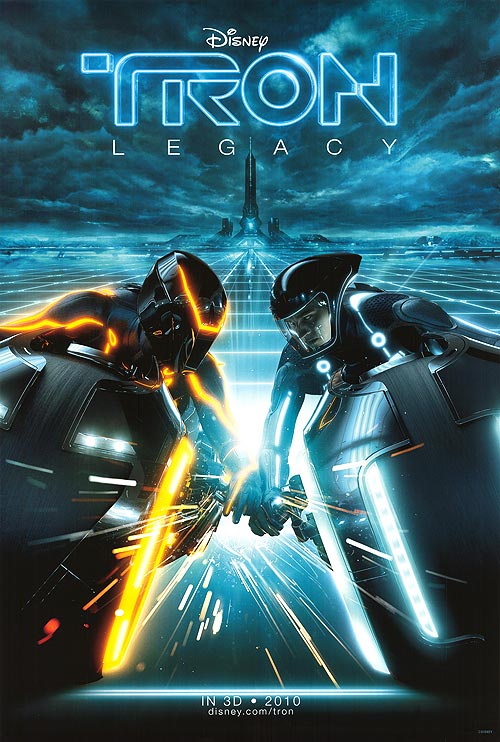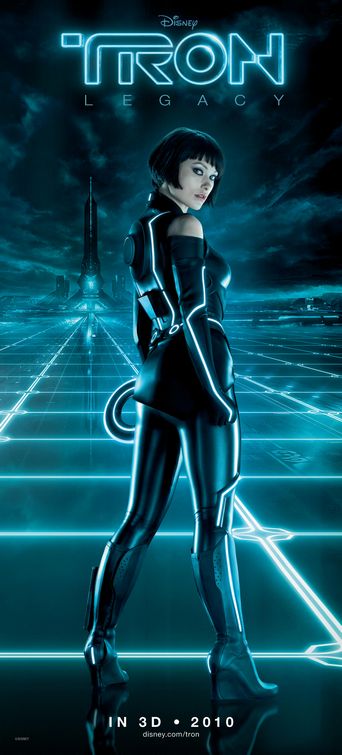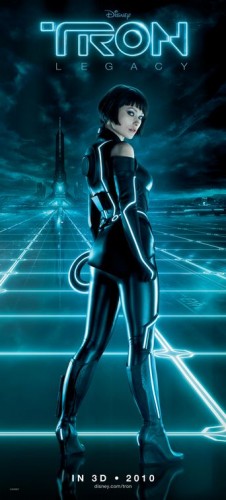 It’s not often a science fiction storyteller creates a new world for his story. Most tales in the genre, like Neuromancer or 2001, are set in our world a few years or decades in the future. Some, like Terminator II, don’t even bother moving the clock ahead. Movies like Star Wars and Avatar are relatively uncommon (while others like The Matrix are difficult to categorize). Tron: Legacy is one of those infrequent works set almost entirely in a fictional world.
It’s not often a science fiction storyteller creates a new world for his story. Most tales in the genre, like Neuromancer or 2001, are set in our world a few years or decades in the future. Some, like Terminator II, don’t even bother moving the clock ahead. Movies like Star Wars and Avatar are relatively uncommon (while others like The Matrix are difficult to categorize). Tron: Legacy is one of those infrequent works set almost entirely in a fictional world.
Kevin Flynn (Jeff Bridges), founder of a tech company and world-recognized innovator, disappeared in 1989, apparently on the verge of some life-altering discovery. Two decades later, Kevin’s assistant tells his son Sam (Garrett Hedlund) he has received a page – as in pager, not book – from his late father. When Sam investigates, he is sucked into a digital world, presumably the one his father disappeared to, and finds himself in a fight for his life.
As far as the setting goes, the movie is entirely convincing. The viewer finds himself carried away with a slick looking set and industry-standard special effects. There is even a whiff, at times, of Stanley Kubrick’s 2001. Complementing the set is a musical score that I found effective, a pulsing sort of number filled with tension. They throw it at you early and often and though I might have preferred some greater variations on the theme, I must say it did much more good than harm.
Perhaps the best part of the film is the opening credits. This left-handed compliment would no doubt dismay the filmmakers, but I mean it as genuine praise. No more than thirty seconds into the movie I was convinced, ready to be taken for a ride. Alas, the strong points are all on the surface.
There is an affliction – deadly to thrillers, action movies and suspense flicks – that seems to be reaching epidemic proportions in modern day cinema. Characters we are meant to believe are experiencing something for the first time evince all of the awe, shock, fear and uncertainty of a seventy-fifth rehearsal. At no time in the movie was I convinced a character believed himself in danger. Moreover, the entire sequence beginning with the page and ending with the discovery of the portal to the digital world is a mystery that is accepted, investigated and solved with ease and efficiency, just like a video game player knows where to go and what to do the thirtieth time he plays a level.
 An attempt is made to create some characters for the audience to care about, but not a strong attempt. Garrett Hedlund never becomes anything more than a featureless Alpha Male, and Jeff Bridges’ talent is largely wasted. Alone among the various roles, Olivia Wilde’s Quorra has some personality. Shockingly, a hot chick in black spandex is not played as an inhumanly cool and confident ass-kicking machine, but rather an earnest, charming and somewhat naíve girl. The decision to buck that tiresome trend must be commended.
An attempt is made to create some characters for the audience to care about, but not a strong attempt. Garrett Hedlund never becomes anything more than a featureless Alpha Male, and Jeff Bridges’ talent is largely wasted. Alone among the various roles, Olivia Wilde’s Quorra has some personality. Shockingly, a hot chick in black spandex is not played as an inhumanly cool and confident ass-kicking machine, but rather an earnest, charming and somewhat naíve girl. The decision to buck that tiresome trend must be commended.
For the libertarian, there is a little meat to chew on, but not much. Early indications almost suggest a stance against copyrights and patents, but it later becomes apparent that Kevin Flynn simply meant his software to be free, not that intellectual property is absurd. Unclear is whether this is meant to be a standard for all or just one Flynn held himself to. There is a point in the movie where Sam is talking about all the problems in his world, and we get the usual litany of leftist bugaboos, global warming foremost among them. The tyrannical authority of the dictator of this digital world is questioned by some, and Quorra suggests there could be a revolution in the making, but this theme is so little developed and unimportant for the conflict’s resolution that I hesitate to say they even scratched the surface.
The single idea that might give the libertarian the most cheer is that the ultimate failing of this world was an attempt to make things perfect. Left unsaid is that this perfection was enforced from above, but it’s obvious for any viewer to discover. What’s more, other programs emerge on their own without central control and coordination, and they are represented as the best of that world. Like the movie itself, the idea is all surface and no depth, but after two hours spent viewing a pretty but shallow movie with a merely competent script, it’s enough to make a viewer smile.
















Comments on this entry are closed.
cinemalogue December 21, 2010 @ 10:00 am | Link
This is a very good point I hadn’t considered in my equally-disdainful review of TRON: LEGACY, a film I feel is more a matter of business giving people what they’re willing to settle for, than creative storytelling that we really crave.
Matthew Alexander December 21, 2010 @ 1:46 pm | Link
It’s something that has always bothered me in poor films. The difference between running half-heartedly through a scene and really delving into it and making it realistic is the difference between Crystal Skull and Raiders of the Lost Ark.
Thanks for stopping by!